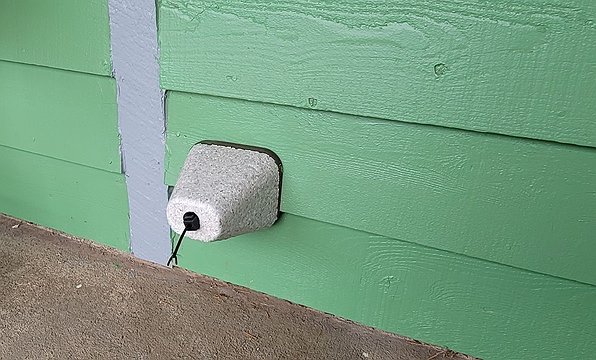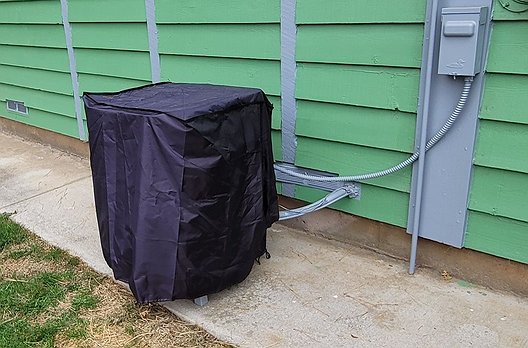Cold incoming: Prepping homes for the Columbia Basin’s cold winters
MOSES LAKE — In case anyone hasn’t noticed, it’s getting chilly out there. Even though the National Weather Service is predicting a fairly mild winter for the Columbia Basin, it’s still a good time to get homes ready for the colder weather.
The first place to look is the pipes. There’s one big mistake that homeowners make, said Steve West, owner of Top Plumbing in Moses Lake.
“They leave their hoses on their outdoor spigots,” West said. “(They may say) ‘Well, I turned it off.’ It doesn’t matter. The hose has to be disconnected.”
Most newer houses use frost-free outdoor spigots with a vacuum system to drain them, West said, which won’t work if the hose is still connected. Older homes without frost-free spigots are even more vulnerable, so it’s important to cover them with a freeze cap during the winter months.
 Keeping pipes from freezing is a challenge in the Pacific Northwest, but a simple cap like this one or an insulated bag on free-standing outdoor spigots can prevent costly burst pipes. Water from a frozen pipe situation can do serious property damage if not caught quickly, so spending a few dollars on a cover can save a lot of money in the long run.
Keeping pipes from freezing is a challenge in the Pacific Northwest, but a simple cap like this one or an insulated bag on free-standing outdoor spigots can prevent costly burst pipes. Water from a frozen pipe situation can do serious property damage if not caught quickly, so spending a few dollars on a cover can save a lot of money in the long run.Homeowners with underground sprinkler systems should have the pipes blown out by a professional every year, West added.
Draining hoses prior to storing them for the winter is also a good idea in order to prevent ice from forming inside them which can cause damage.
The Grant PUD website offers tips for homeowners preparing to face the frigid months. Maintaining the weather stripping on exterior doors and windows will help hold in the heat, the PUD wrote. Windows that have a draft should be covered and sealed tightly with some heavy-duty clear plastic. Closing drapes in the evening and on overcast days will help keep heat in the home as well, the PUD wrote.
Owners who have a heat pump should schedule a service visit to see if it needs maintenance, making sure the filter is clean and fitted properly.
Finally, homeowners should go around the house and close or plug foundation vents. That not only keeps the living space warmer but also insulates the pipes under the house.
According to Ray Acheson, manager of Valley Quality Homes in Moses Lake, owners of manufactured homes have a few extra precautions to take.
When Valley Quality places a home, Acheson said, they put a cement wall around the foundation and taper it 2-3% to divert water away from the underside of the home.
“Some places grade them flat, and then you can get water underneath the home,” Acheson said. “And if you do, you can get your warranty voided on the house. That's not good at all.”
The best solution for a manufactured home owner who doesn’t have the concrete wall is to rake some gravel or sand around the home and smooth it out to a taper, he added.
Buyers of manufactured homes should look for Energy Star certification, said sales representative Rudy Salazar. That certification, issued by the Environmental Protection Agency, is an indication of energy efficiency in the home’s construction, as well as in the appliances.
Snowbirds and others who only live in the home part of the year should keep the home heated if they’re away in the winter, Acheson said.
“I like to leave the heat at like 55 or 60 in the house, even if they're gone all winter because that keeps the pipes from freezing,” he said. “And you can't blow it out, really, to get it perfect.”
“When it comes to winterizing, the best (thing) is just good common sense,” Salazar said.
 Air conditioners won’t be used much in the chilly winter months. Covering the outside unit with an inexpensive vinyl covering, like the one shown here, can keep debris from getting into the unit and prevent maintenance concerns in the spring. Covers such as this one sell for about $20-$40, depending on features and size.
Air conditioners won’t be used much in the chilly winter months. Covering the outside unit with an inexpensive vinyl covering, like the one shown here, can keep debris from getting into the unit and prevent maintenance concerns in the spring. Covers such as this one sell for about $20-$40, depending on features and size.Joel Martin may be reached via email at jmartin@columbiabasinherald.com.
Save energy this winter:
• Use ceiling fans to gently direct rising heat downward. This makes the room feel warmer without turning up the heat.
• When you are home and awake, set your thermostat as low as comfortably possible.
• When you are asleep or out of your home, turn the thermostat down even further. A programmable thermostat can help you adjust your heat to match your schedule. If you have a heat pump, it is recommended to not drop your thermostat lower than 4 degrees below your normal heat setting.
• Lower the heat setting on your water heater. The U.S. Department of Energy estimates that 18% of a household's energy consumption is from water warming. Keeping your temperature at 120 degrees will help you see small changes in your energy bill.
SOURCE: Grant County Public Utility District





